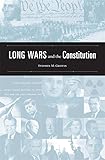Long Wars and the Constitution / / Stephen M. Griffin.
Material type: TextPublisher: Cambridge, MA : : Harvard University Press, [2013]Copyright date: ©2013Description: 1 online resource (374 p.) : 1 tableContent type:
TextPublisher: Cambridge, MA : : Harvard University Press, [2013]Copyright date: ©2013Description: 1 online resource (374 p.) : 1 tableContent type: - 9780674058286
- 9780674074453
- 342.73/0412
- online - DeGruyter
| Item type | Current library | Call number | URL | Status | Notes | Barcode | |
|---|---|---|---|---|---|---|---|
 eBook
eBook
|
Biblioteca "Angelicum" Pont. Univ. S.Tommaso d'Aquino Nuvola online | online - DeGruyter (Browse shelf(Opens below)) | Online access | Not for loan (Accesso limitato) | Accesso per gli utenti autorizzati / Access for authorized users | (dgr)9780674074453 |
Browsing Biblioteca "Angelicum" Pont. Univ. S.Tommaso d'Aquino shelves, Shelving location: Nuvola online Close shelf browser (Hides shelf browser)

|

|

|

|

|

|

|
||
| online - DeGruyter The Challenge of Congressional Representation / | online - DeGruyter Industry and Revolution : Social and Economic Change in the Orizaba Valley, Mexico / | online - DeGruyter Mind, Modernity, Madness : The Impact of Culture on Human Experience / | online - DeGruyter Long Wars and the Constitution / / | online - DeGruyter Why Are Professors Liberal and Why Do Conservatives Care? / | online - DeGruyter The Summits of Modern Man : Mountaineering after the Enlightenment / | online - DeGruyter From Shame to Sin : The Christian Transformation of Sexual Morality in Late Antiquity / |
Frontmatter -- Contents -- List of Acronyms -- Introduction -- 1. War Powers and Constitutional Change -- 2. Truman and the Post-1945 Constitutional Order -- 3. War and the National Security State -- 4. Vietnam and Watergate -- 5. The Constitutional Order in the Post-Vietnam Era -- 6. The 9/11 Wars and the Presidency -- 7. A New Constitutional Order? -- Appendix: Executive Branch War Powers Opinions since 1950 -- Notes -- Acknowledgments -- Index
restricted access online access with authorization star
http://purl.org/coar/access_right/c_16ec
In a wide-ranging constitutional history of presidential war decisions from 1945 to the present, Stephen M. Griffin rethinks the long-running debate over the "imperial presidency" and concludes that the eighteenth-century Constitution is inadequate to the challenges of a post-9/11 world. The Constitution requires the consent of Congress before the United States can go to war. Truman's decision to fight in Korea without gaining that consent was unconstitutional, says Griffin, but the acquiescence of Congress and the American people created a precedent for presidents to claim autonomy in this arena ever since. The unthinking extension of presidential leadership in foreign affairs to a point where presidents unilaterally decide when to go to war, Griffin argues, has destabilized our constitutional order and deranged our foreign policy. Long Wars and the Constitution demonstrates the unexpected connections between presidential war power and the constitutional crises that have plagued American politics. Contemporary presidents are caught in a dilemma. On the one hand are the responsibilities handed over to them by a dangerous world, and on the other is an incapacity for sound decisionmaking in the absence of interbranch deliberation. President Obama's continuation of many Bush administration policies in the long war against terrorism is only the latest in a chain of difficulties resulting from the imbalances introduced by the post-1945 constitutional order. Griffin argues for beginning a cycle of accountability in which Congress would play a meaningful role in decisions for war, while recognizing the realities of twenty-first century diplomacy.
Mode of access: Internet via World Wide Web.
In English.
Description based on online resource; title from PDF title page (publisher's Web site, viewed 18. Sep 2023)


